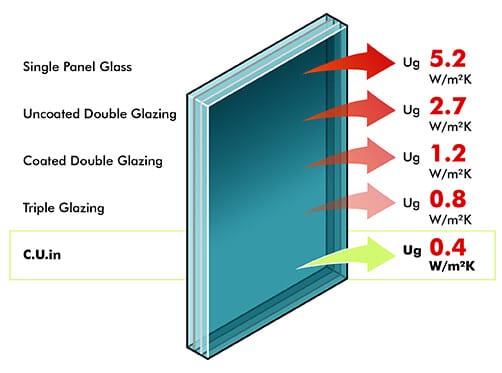Your Guide to Picking Acoustic Windows

Image Sources: CUIN Glass UK
Do things like horns blaring and loudspeakers spewing sermons make it difficult for you to work? Are you unable to go to sleep due to the noisy party going on at your neighbour’s house?
Amid bustling streets and skyscraping industries, contemporary residences and offices are created. This results in a noisy disruption that is brought on by the crowd, traffic, and equipment employed in the industry. This kind of noise prevents you from concentrating on your job, causes damage to your hearing, disrupts your mental health, and lowers your overall productivity. The decision to live in a major city is determined by many different criteria, with noise management with acoustic glazing being among the most crucial.
Why is it Bad for You to Be Around Noise?
The range of audible frequencies that may be perceived by the human ear is anywhere from 20 to 20,000 hertz, which translates to a hearing range of up to 140 dB. Any sound that is more than 90 dB is considered to be very loud and distressing.
Acute hearing loss may be caused by sounds with a decibel level of more than 130, which can either temporarily or permanently damage the cochlea and the eardrums.
In addition to causing hearing loss, loud sounds are known to be the cause of a variety of other health issues, including stress, tinnitus, elevated blood pressure, disturbed sleep, an inability to concentrate, and a deterioration in cardiovascular health.
When it comes to workplaces, excessive noise from the outside may be a major distraction for workers, have a poor impact on customers, reduce privacy, and reduce overall productivity. In a similar vein, having a calm house is little more than an illusion if it is not adequately soundproofed. Soundproofing with acoustic double glazing is essential not just in medical facilities but also in laboratories, recording studios, and classrooms.
How Can You Prevent Noise From Entering Your Home or Place of Business?
Soundproofing should be your top concern if you do not want to be distracted from your job by continuous noise from the outside world and if you want to come home to a peaceful bedroom and relaxed living space after a long day.
To soundproof a place, traditional materials such as mass-loaded vinyl sound barriers, acoustic mineral wool, green glue, and silicone caulk are often employed.
Installing acoustic windows is one of the most cutting-edge and useful methods to soundproof a room, even though these options continue to be popular choices for many.
How Do Acoustic Windows Actually Function?
A few decades ago, people only thought of windows as a way to let light and fresh air into a room. Even though this is still the case, acoustic windows have soundproofing properties that are very beneficial for those who live in loud cities.
Since sound is a mechanical wave, its transmission needs the presence of a medium to be successful. When sound waves move through a transmission medium, the medium will vibrate in a unique way, which will result in a variable speed and frequency of transmission. The placement of a barrier between the source of a sound and the listener is necessary to accomplish soundproofing.
Windows constructed following the third way are often the most effective at obstructing the transmission of undesirable noises. The sound may be reduced by around 40 decibels with the use of double glazing u value windows, while the use of laminated glass gives even higher sound insulation. Acoustic windows that have been thoughtfully built may cut down on unwanted noise by around 90–95% for certain frequencies.

What Should You Search for in Soundproof Windows?
Many acoustic window solutions are available on the market from a variety of manufacturers; however, only a few of them may be suitable for your specific requirements. There are a few considerations you need to give attention to in advance of making an investment in acoustic windows.
STC Ratings
The sound transmission class (STC) ratings are what is used to assess how well soundproof windows perform. The higher the STC rating of an acoustic glass product, the greater the amount of sound insulation that it offers. On an STC scale, the typical rating for a single-pane window is somewhere about 27. This grade is a 28 for double-paned windows. The STC value of acoustic windows may range anywhere from 40 to 50. Even though a higher STC rating indicates superior soundproofing, the window that you choose to soundproof your area should be able to accommodate your requirements. It’s possible that you won’t need excessively high STC ratings for your acoustic windows if the location of your business isn’t too loud.
Personalisation
The majority of both your home and workplace are meant to represent your unique personality and aesthetic preferences. This should continue to be the case even for your windows and doors. Your preferences may be taken into account when designing windows made of acoustic laminated glass.
Modification with the Frames
Because there are many various kinds of window panes, the acoustic window that you choose must be compatible with the window frame that you want to use. Always make sure to purchase acoustic windows from a reputable company that specialises in offering customised window solutions for uPVC, wooden, and aluminium frames. This will not only ensure that your area has the appropriate décor but will also guarantee that it has excellent sound insulation.
Contact CUIN Today
Single glazed window insulation not giving the desired results? Switch to CUIN today! C.U.in windows use an invisible film between the panes of glass to provide the appearance of triple-paned glass. Along with other characteristics like steel spacers and Low-E coating, the inert gas within the glass becomes exceptionally effective at thermal insulation.
If you own a house in the UK and want to make the most of it without breaking the bank, C.U.in is a great option for you. It’s a cost-effective way to take advantage of the advantages of both double and triple glazing. Get in touch with CUIN experts to find out more about how to save energy bills with the best soundproof windows.


